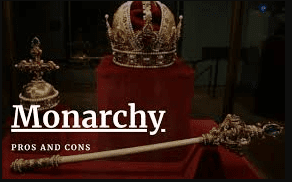ü Monarchy
A monarchy is a form of government in which the monarch, a single ruler who serves as head of state, has the highest authority. It often serves as both a political-administrative body and a nobility-focused social gathering known as a "court society."
ü Benefits of Monarchy:
1. Trained Leaders
Before, there was no assurance that the heir to the throne would be capable of handling all the duties that go along with it. But in the modern era, crown princes receive political education from a young age and are frequently better educated than the elected official of the people. The media's scrutiny of monarchs deters the incoming ruler from getting involved in pointless and disagreeable relationships. So, when it's time, a skilled ruler will take charge.
2. Decision-making is made more quickly
In contrast to parliamentary systems, where laws must first be approved by a majority of lawmakers and then signed by the legislative leaders, the monarch's judgment is the last arbiter in monarchies. This makes it possible for the government to respond quickly to emergencies.
3. Results in Higher Government Savings
Elections, which consume a significant portion of public finances, are not necessary under a monarchical style of governance. The government can raise the residents' level of living by using the money that was saved.
4. Easy Transfer of Power
In a monarchy, the future king or queen has already been chosen and is known to the populace, preventing rioting and protests once the new ruler is sworn in. This is quite helpful if the present monarch abdicates or dies suddenly because the new monarch will take over right away.
5. An effective and impartial government
There are many different types of monarchies, allowing for a balanced system with a legislative body chosen by the people and a monarch who has a good amount of authority but is constrained by a Constitution drafted by the people's elected representatives. By having a common ruler, a country can feel more united and people's opinions can be taken into account.
ü Negative aspects of monarchy:
1. Might result in tyranny
It will be simple for a monarch with absolute power to become blinded by the power. A despotic ruler's abuse of power to oppress the weaker members of society would unavoidably spark riots that would leave many people suffering and the country in ruins.
2. The government's dearth of diversity
There must be individuals inside the government who communicate the demands of a specific class of society to those in authority in order for the government to function in accordance with the needs of the citizenry. Diversity in government representation ensures that diverse laws are created and that these laws will benefit all groups.
3. Variations based on the ruler
A good leader would lead to a country that was well run, whereas a bad leader may undo everything his predecessors had worked so hard to achieve. We can never be too confident about whether the forebears of a very effective ruler would carry on the tradition or not.
A ruler may also be installed at a very early age as a result of the rapid demise of the outgoing one. This might cause political unrest in countries with absolute monarchies.
4. Monarchy's Unparalleled Power
In a country with an absolute monarchy, the populace has very little to no power to challenge the ruler. Even though constitutional monarchies allow for the representation of the people in the government, the monarch still has a significant amount of authority that they are free to utilize however they see fit.
ü The World's Remaining Monarchies
Even though there are now fewer absolute monarchs than ever before and a greater variety of power-sharing arrangements between monarchs and elected governments, there is still some monarchy in existence today. The monarchs in the world as of 2021 are listed below:
Europe
- Andorra (principality)
- Belgium
- Denmark
- Liechtenstein (principality)
- Luxembourg (grand duchy)
- Monaco (principality)
- The Netherlands
- Norway
- Spain
- Sweden
- The United Kingdom of Great Britain and Northern Ireland
- Vatican City (elected ruler)
Polynesia
- Tonga
Africa
- Eswatini
- Lesotho
- Morocco
Asia
- Bahrain
- Bhutan
- Brunei (sultanate)
- Cambodia
- Japan
- Jordan
- Kuwait
- Malaysia
- Oman (sultanate)
- Qatar
- Thailand
- Saudi Arabia
- United Arab Emirates
